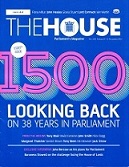CHANNEL ISLANDS MEASURE - MOTION TO DIRECT: AMENDMENT TO THE MOTION
| 15th July 2020: Lord Faulkner of Worcester: My Lords, I have taken the unusual step of tabling an amendment of regret to the Motion moved so ably by the right reverend Prelate the Bishop of Birmingham, because it is demonstrably clear to me as a member of the Ecclesiastical Committee that a senior and distinguished member of the clergy, the very reverend Bob Key, the former Dean of Jersey, had suffered a grave injustice at the hands of the Church of England during the events that led up to the decision on 9 March 2013 to strip him of his commission over the safeguarding issue to which the right reverend Prelate referred. That followed publication of an investigation carried out for the Winchester diocese by a psychotherapist called Miss Jan Korris. Her report was highly critical of the dean but contained serious flaws. As the noble and right reverend Lord, Lord Chartres, said in his brilliant report on the relationship of the Channel Islands to the wider Church of England: “That there were flaws may, in significant measure, be attributable to the fact that the draft report was published on the diocesan website before the participants could take advantage of the offer provided by Ms Korris to give them the draft report” before publication. Adding to the hurt caused to the dean and to others on Jersey, it remained there until 2016 and the right reverend Prelate the Bishop of Winchester and the dean never met to discuss it. The dean was reinstated on 28 April 2013, but not before considerable distress was caused to him and his wife and much damage done to the relationship between the diocese of Winchester and the church in Jersey. In the next month, a further inquiry was commissioned by the right reverend Prelate the Bishop of Winchester under the chairmanship of Dame Heather Steel, a former judge of the High Court of Justice and the courts of appeal on Jersey and Guernsey. A full-page advertisement in the name of the right reverend Prelate was inserted in the Jersey Evening Post on 3 August 2013 about the Steel investigation. It included the words: “upon receipt the Bishop of Winchester will supply a copy of the report ... to the Bailiff of Jersey, the Dean of Jersey and the Ministry of Justice.” Within three months, the right reverend Prelate was able to say that, based on what he had seen of Dame Heather’s findings to date, he would not be taking disciplinary action against any member of the clergy, but had decided not to publish the Steel report. It was not until May 2016 that the Bailiff of Jersey was told that he would not get a copy of the report, and that prompted the response from him that “the decision will come as a disappointment to many in and outside the islands.” As someone who knows the Channel Islands well— I declare an interest as a vice-chair of the Channel Islands All-Party Parliamentary Group—I can tell the House that that was quite an understatement. The view on Jersey about how their much-loved and respected dean, who served ex officio in the States Assembly and had a commission under letters patent from the Queen, was one of hurt and outrage. One example—there are many others—is a letter from Senator Sir Philip Bailhache, a former Bailiff, to the most reverend Primate the Archbishop of Canterbury on 4 November 2015. It states: “It is a sad fact that no pleasure has been expressed, either publicly or privately (to the best of my knowledge), by the Bishop of Winchester that the clergy in Jersey have been exonerated. Furthermore, no expression of regret has ever been forthcoming for the unjustified humiliation and distress visited upon the Dean and his wife.” A press release issued on 19 May 2016 by the chambers of the Bailiff, William Bailhache—Sir Philip’s brother—stated: “Dame Heather telephoned the Bailiff this morning as she too had received notice from the Bishop of Winchester’s lawyers of his decision not to publish her report. She said that she had written to the Archbishop some months ago to say that the Dean and the other member of clergy concerned were good men who should be exonerated. She told the Bailiff that ‘This exoneration should now be made public. It is totally inappropriate that my report should be suppressed without reference to this fact.’” On the same day, the Bailiff received a letter from the most reverend Primate the Archbishop of Canterbury, in which he said that he had “met the Dean and his wife at Lambeth on 11th May.” He stated: “I remain deeply conscious of the enormous personal stress, hurt and uncertainty which Bob and Daphne have suffered” and referred to Dame Heather’s public statement that “no blame for the handling of the original complaint … can rightly be attributed to them.” He also said that he offered “an apology for the hurt and the treatment which they have received over these past years”. The most reverend Primate’s generosity of spirit will come as no surprise to those of us in your Lordships’ House who admire him and regard him as a friend. It is a pity, though, that not everyone in the Church hierarchy has shown a similar understanding towards the former dean’s difficulties. Had they done so, it might not have been necessary for this measure to be brought before us and for the Channel Islands to move from the diocese of Winchester to the diocese of Salisbury after 451 years. I beg to move. A link to the rest of the debate here |


































